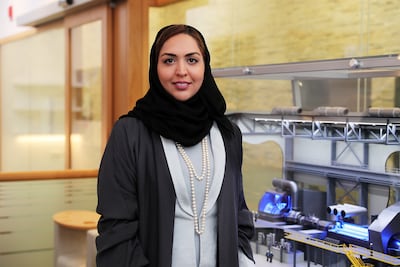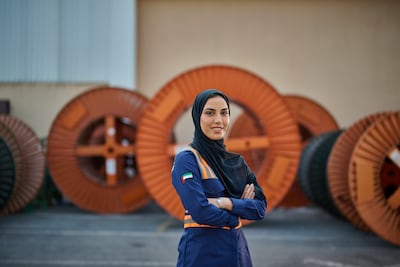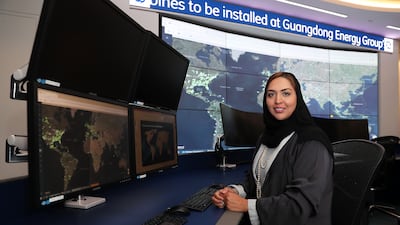A growing number of Emirati women are now carving out a career in engineering and technology.
Stem is the widely used umbrella term for education courses focusing on careers in science, technology, engineering, and mathematics. Stem careers are viewed as jobs of the future and women in the Emirates are being encouraged to take on highly skilled roles.
GE Power's engineering director for outage planning in Europe, Middle East and Africa
Female leadership in these competitive sectors is a domestic priority and the key to throwing open doors for young girls exploring hi-tech professions.
Here The National speaks to two Emirati engineers at different stages in their career to find out what drives them and how they are paving the way for other women.
Fighting bias with expertise
Emirati engineer Noora Kheily urged young girls to forge their own path and never allow others to dictate their future.
An engineering director with GE Power for Europe, Middle East and Africa, Ms Kheily was always passionate about physics as a young girl.
“I believe you should choose what you love to do despite people telling you otherwise,” she said.
“I loved physics, I was excellent at it so I chose mechanical engineering and I have continued on the technical path.
“Not a lot of people encouraged me to be a mechanical engineer. They said, ‘why mechanical engineering, it’s for boys'. But I just liked physics.”

She leads a team in outage planning that involves making sure more than 2,000 GE-built gas turbines that power homes and industries in Europe, Middle East and Africa run optimally and reliably.
“The number one priority is keeping the lights on,” she said.
Gas turbines are engines that are the heart of power plants and Ms Kheily is the first female in the region to head the role.
“I find it rewarding to solve any issues of gas power plants which means I’m making sure that cities, schools, hospitals and houses do not have a power cut or shortage,” she said.
“It is important to me to make sure if there is an issue, it’s solved on time so there is no disruption in the grid and there is electricity for day-to-day activities for everyone in the city.”
As the mother of two girls aged five and eight, she wants more schools to embrace practical learning where children gain a deeper understanding of coding, 3D printing and new technology.
“We need to find ways to integrate all schools worldwide with today’s technology so children have the right tools to get more information,” Ms Kheily said, who has had support from her mother and six sisters.
“My daughters need to know more about AI, they should be exposed to more technology.”
The engineering field now has more women recruits than when she started out as a junior mechanical engineer 14 years ago after graduating from the American University of Sharjah.
Any scepticism people have about a woman in her position dissolves once they understand her technical expertise.
“As a female in mechanical or electrical, any (doubts) go away in the first one or two minutes, once we talk technical,” she said.
“When a gas turbine is down, everyone wants a solution.
“Every bias got eliminated when they saw the real value of my experience in getting the gas turbine running.
“When you have the right technical knowledge and experience — that is what matters.”
Women as empowering leaders
Ms Kheily said a central focus was her team’s well-being. She sets aside the start of each day to gauge the support they require.
“I find out everything they need from tools to software and also make sure my team is emotionally and mentally supported by me as their manager,” she said.
“The first part of the day, I block the calendar to make sure I complete everything for my team and then start planning for the gas turbines.”
A recent study by consultancy firm KPMG showed that women in prominent roles had an inspirational impact.
“Women leaders bring a balanced and forward-looking management style to the workplace,” said Gunjan Shroff, partner, people and change at KPMG Lower Gulf.
“According to a recent KPMG study, women leaders prioritise investment in developing their workforce’s skills and capabilities to prepare the workforce to take on pandemic-induced challenges head-on and build resiliency through lifelong learning and growth opportunities.”
About 66 per cent of women hold government roles in the UAE, including 30 per cent of senior leadership positions and decision-making roles, the study showed.
“It all starts with empowerment,” Ms Shroff said.
“Female leaders must see and feel their sense of purpose within a company at every turn. This mutual commitment can have a domino effect that leads to better teams, a better company, and even a better society overall.”
Follow your heart
Shaima Al Hammadi, 23, is the youngest engineer in Ducab, a leading UAE company that manufactures cables for the energy sector, renewable energy sector, solar projects, marine and nuclear cables.
Ms Al Hammadi graduated at the top of her class in electrical engineering from the Higher Colleges of Technology, Abu Dhabi, last year.
She works as a compliance engineer in a plant with over 50 machines as part of a team that audits, plans new projects and creates master data.

“I chose electrical engineering because I have an interest in renewable energy as a technology and a source of energy,” she said.
“The most exciting part of my job is that I’m working in a new division where we establish master data to find the smartest solutions for the company.”
She is the second engineer in her family, following in the footsteps of an elder sister.
But Ms Al Hammadi is clear science are not the only choice for aspiring graduates.
“It’s not about only engineering, women should have the curiosity to look up new sectors,” she said.
“They have to follow their heart.
“It’s not just about what our parents and grandparents have always told us — to be a doctor or engineer — there are so many more opportunities right now.
“We need to look to what we feel passionate about.
“It’s not just about a bachelor’s degree. It has to be something you can put your personality and passion in to because otherwise it will be like any routine job.”
The young engineer nurses the ambition of becoming a government minister or chief executive.
“I would like a leadership position where I can impact other people’s lives in a positive way,” she said.
“Then I will have the power to help many more people than I do right now.”


